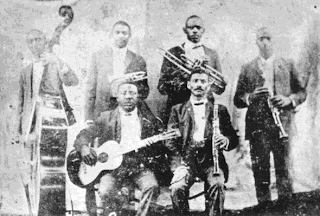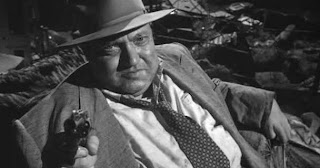In America, jazz music is probably more popular in theory than any measurement of actual fan-dom; people say they like it, but it doesn’t often come up in their daily iPod shuffle. Perhaps jazz’s borderline eccentricity keeps any jazz musician or band from becoming wholly popular—and thus worthy of criticism, spite and condemnation. Still, jazz is probably the most American genre of music; not just in terms of its creation but how it directly influenced 20th century America.
It should shock no one that jazz—like country, rap and classical music—has racially specific origins. Basically, by 1890 the first generation of Africa-Americans who had never known slavery were trying to find work but still barred from anything besides the cheapest employment. And just like nowadays, society forced unwanted, uneducated and untalented individuals into the entertainment industry; unlike nowadays, these 1890s entertainers were not paid by the truckloads but rather next to zilch. In response, many black entertainers in the Deep South picked up old European instruments and attempted to mimic the songs, rhythm and music of an ancestral Africa. Seeking low-level venues, most of the musicians ended up at one point or another in the lowest of venues: the red-light district of New Orleans.

And in their early days, this band even opened for the Rolling Stones!
The New Orleans neighborhood of cheapest brothels and bars was known as “Storyville”—for spending a night there inevitably led to quite the story. And to live there was to create a masterpiece…or die from an exhausted liver. Over the next few years, the original noise took on varied forms and attracted more classically trained musicians. “Rag time” music became “swing music” and eventually “jazz”—a word with such perplexing etymology that it was literally awarded “Word of the Twenty Century.” If one follows historical gossip, the origins are unspeakable and somewhat related to prostitution. Let your own mind try to connect the filthy, filthy dots; but I, for one, take pride that slang was as subtly gross a century ago as it is now. Perhaps I’ll be able to use “jazz” in its originally vulgar sense before the end of this post. Unrelated: everyone should check out www.ski-ski-ski.com.
Anyhow, Storyville and its collective, nameless clientele were all happy, firm and good until around 1917, when America realized it was going to need to enter The Great War. That was the original World War; and like a lot of originals, it had a smaller budget, less known cast and was really created by the British. America, though, acknowledged it needed as many sailors as possible, and functional ports to the Atlantic Ocean. This meant cracking down on prostitution--which had always been illegal in New Orleans but just never enforced. New Orleans had allowed rampant prostitution for decades because most of the ‘johns’ were sailors passing by and it was awfully convenient for the local economy to have the out-of-towners drain a two-week paycheck in eight minutes. Anyhow, Uncle Sam nixes everyone’s fun and brothels and bars go belly up faster than in the aftermath of an oil spill. With this development, many jazz musicians teamed up into combos and went upriver, so to speak. And literally. They went to Chicago.
On a related reaction to WWI, Prohibition took effect and speakeasies boomed in the biggest city that combined port-convenience (Lake Michigan/Mississippi River) and brewery-proximity (thanks to the East Coast elitists kicking German immigrants to the Midwest). Anyhow, Germans were known for their beer and so drinking a beer was the equivalent of getting shot by the Kaiser or, worse, at least funding him. The same limited and pointless patriotism in America led to sauerkraut being renamed "freedom cabbage."
The Chicago speakeasies, desperate to find excellence among the thousands of competitors, fought for the best new entertainment. The bars, disregarding segregation expectations, helped people of all races fight off that harsh and vile grip of sobriety and became known as “black-and-white” or “tan” joints. All the bacchanalian fun had a price, though.
And that price was dealing with the very out-spoken and public figure of Al “The Original Scarface” Capone. In 1913, the U.S passed the 16th Amendment—which technically allowed for Congress to pass an income tax, but more subtly cleared the way for Prohibition (as the country would no longer need to tax alcohol). Oddly, the repeal of Prohibition did not repeal the Income Tax, but that’s straying a bit from the point. Capone, unlike other criminals, failed to report his ill-gotten gains and got himself jailed for tax evasion. The same crime that would later give Timothy Geithner the position of Secretary of the Treasury gave Al Capone eleven years in the big house. Indeed, cupidity is the downfall of some.
So Capone’s network of organized crime collapses and Chicago falls into a quarry of regrettable lawfulness—or at least as much as Chicago would ever see. This means opportunity needed a new direction; and probably would have swung even closer to Canada, as so much alcohol was coming from over the border. However, national prohibition was repealed in 1933 and so Vice and her sister Fun started to move back down to New Orleans. However, they stopped about halfway there and realized that Prohibition had helped along the popularity of the automobile and drastically increased Americans’ mobility. This meant, for a time at least, the most logical place to throw the never-ending party was in the middle of the country. And so jazz thrived in Kansas City.
As expected, Kansas City was as desperate as any city in the Great Depression to export a reputation and import raw capital. A local man named Tom Pendergast became unofficial ringleader of bawdy entertainment. He put some guy named Harry Truman in the Senate and then followed Capone in spirit by getting himself arrested for juggling baby seals. Just kidding; it was for tax evasion. It was just around this time that Japan ruined Vito Corleone’s birthday and the United States was once again called upon to escalate/end a World War.
Immediately unconcerned in 1942 with actually winning (or even fighting) in the war, the country pulled millions of innocent Japanese, Korean, Chinese, Vietnamese, Taiwanese and Mexican U.S. citizens from their homes and sent them off to build patriotic shacks in the desert and learn the rules of football (“Now that’s ‘merican!”). This left thousands upon thousands of homes in Los Angeles, and other West Coast cities, deserted—creating one of the most absurd buyers-markets in real estate history. On top of this, aircraft and munitions factories opened up and needed thousands of workers—mostly made up of African-Americans, who were, again, hindered from actually serving in the war.
For a time, Los Angeles's 4th Street became a hub of entertainment for black and white kids, now focused more on freedom and peer-pressure than getting as blisteringly drunk as their parents twenty years earlier. Stunning everyone who had failed to think five years into the future, General Motors made a killing from WWII production and used the unprecedented profits to buy city bus and rail systems nationwide (including L.A.!) and immediately shut them down. This had the dual effect of forcing Americans to buy more cars and allowing them to move away from the cities’ downtown districts. Federal, state and local funds went toward building and maintaining new neighborhoods that disallowed non-white homeowners and so the American inner-city ghetto, as we now know it, was formed.
At the same time as this staggering discrimination, Europeans were thrilled to accept any American-style entertainment. Not entirely because they thought us all heroes, but mostly because their industries had been bombed into ashes and life is only so tolerable without some form of manufactured escapism. In short, jazz music—and, my more dear expertise, Western films—became widely popular while 1950s Americans grew bored and pharmaceutically sedated. Ultimately, young plebian Europeans (and a couple of Americans) slaked their restlessness by giving jazz and, the closely related, folk music genres an inspired edge. And thus was born Rock 'n Roll.
To come back to the vulgar etymology of American music, the term "rock n' roll" did not originally describe the music but rather referenced how young people supposedly responded to it. Specifically, they rocked (on their heels) and proceeded to roll (about in their beds). Yes, "rock 'n roll" is a 1950s equivalent to "gettin' jiggy wit it."
While an epilogue to the jazz era may not be entirely appropriate, an admission that jazz is not what it once was should be inarguable. With absolutely no evidence, I blame Generation X and their relentless desire to sub-divide every caveat of entertainment, forcing me to acknowledge my own continued, incorrect usage of the term “jazz.” Surely at many points I could have specified the genres of “New Orleans Dixieland,” “big band-style,” “Swing,” “Be-Bop,” “free jazz,” “Latin jazz,” “Afro-Cuban,” “acid jazz,” and “nu jazz.” In failing to do so, I likely deserve any scoffs coming my way. In response, well, they can go kiss my jazz*.
*Man, I hope I used the original term correctly there.









